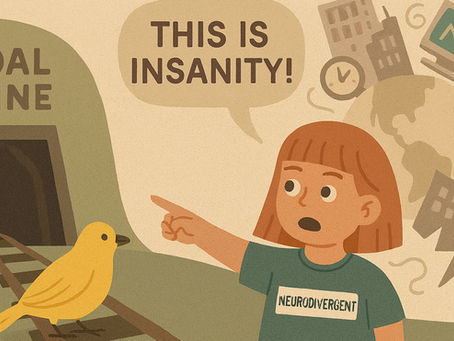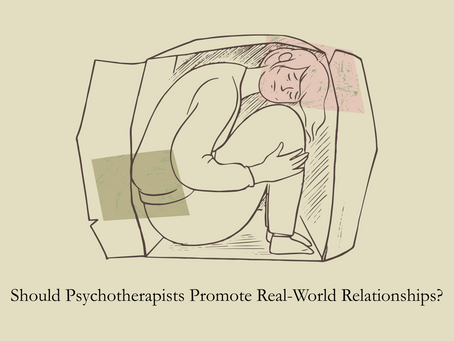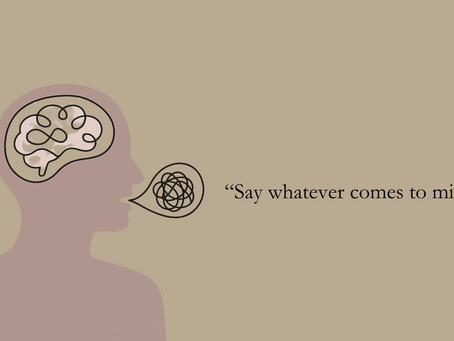top of page
All Posts


Specialist Psychological Assessment
Too often, assessments rush to diagnose without understanding the full picture. A specialist psychological assessment goes deeper—exploring your history, relationships, neurodivergence, and emotional patterns. It’s about clarity, not just labels. With a personalised formulation, you gain a roadmap for therapy, support, and lasting change. For complex struggles, depth is not a luxury—it’s the foundation for progress.

Kirstan Lloyd
Jul 17, 20254 min read


Canaries in the Coal Mine: Neurodiversity, Modernity, and Burnout
Burnout among neurodivergent individuals isn’t a sign of weakness — it’s a warning. This blog explores how masking, overwork, and system design drive distress, and why accommodations benefit everyone, not just a few.

Kirstan Lloyd
Jul 10, 202510 min read


Beyond CBT: A Biopsychosocial Framework for Complex Mental Health
Many therapies fail not because clients are resistant, but because the model is too narrow. This post explains why complex mental health requires a biopsychosocial approach—one that considers biology, life history, and social context—instead of relying solely on short-term CBT or medical diagnosis.

Kirstan Lloyd
Jun 23, 20255 min read


Should Psychotherapists Promote Real-World Relationships?
Should therapy stay in the room, or reach into the real world? This post explores why relationships matter for emotional health — and whether psychotherapists should actively support clients to build and sustain real-life connections.

Kirstan Lloyd
Jun 6, 20256 min read


Why We Need Relationships: The Link Between Connection, Emotion and the Social Brain
We’re wired to connect — but why does connection matter so much, and why is it so difficult for some? This post explores how relationships shape our mental health, what gets in the way, and what we can do to build real, safe connection.

Kirstan Lloyd
Jun 2, 20259 min read


Mind the Gap: The Space Between the Experience and Expression of Self
Exploring how executive function, masking, and neurodivergence shape the gap between who we are and how we express ourselves.

Kirstan Lloyd
May 27, 20257 min read


Executive Function in Neurodiverse Adults
Executive dysfunction in adults isn’t laziness — it’s often the result of unmet neurodevelopmental needs. Learn how ADHD, autism, and trauma impact executive function, and how to rebuild it with structure, regulation, and compassion.

Kirstan Lloyd
May 22, 20254 min read


I Got a Diagnosis… Now What?
What happens after a mental health diagnosis? This post explores the real work of therapy — from stabilisation to identity repair and integration — through a trauma-informed, compassionate lens.

Kirstan Lloyd
May 20, 20256 min read


Nature Is Not Just Calming, It Is Regulating
Many of us feel overwhelmed, burnt out, or constantly overstimulated. But what if the answer isn’t doing more — it’s returning to something simpler? This post explores why nature is not a luxury but a biological need, and how it helps regulate our bodies, calm our minds, and reconnect us to what matters.

Kirstan Lloyd
May 13, 20255 min read


More Than Forgetfulness: Understanding the Cost of ADHD at University
Many students with ADHD arrive at university bright and hopeful, but quickly feel overwhelmed. This post explores why they struggle, what support really helps, and how to build a life that feels manageable and meaningful.

Kirstan Lloyd
May 11, 20257 min read


Parental Resilience and Meltdowns: When Acting Out Means Your Child Feels Safe
What if meltdowns aren't a sign of parenting failure, but of emotional safety? This post explores how resilient, “good enough” parenting can be the calm in your child’s storm—especially when raising a neurodivergent child.

Kirstan Lloyd
May 9, 20255 min read


When the Parent Is Also Autistic: Why Parenting Support Must Consider Neurodiversity
What if the child isn’t the only neurodivergent person in the family? This blog explores the overlooked reality of Autistic parents, especially mothers, and why parenting support must be reimagined through a neurodiverse lens.

Kirstan Lloyd
Apr 11, 20257 min read


Free Association Isn’t Outdated. It’s Underrated.
Free association remains a powerful tool in psychodynamic therapy, especially for clients with complex presentations

Kirstan Lloyd
Apr 8, 20254 min read


Early Detection in Neurodiverse Children: Why It Matters
Understanding who gets missed, what to watch for, and how timely assessment can change a child’s future.

Kirstan Lloyd
Apr 2, 20257 min read


Dr Jekyll, Mr Hyde, and the Neurobiology of Connection: Reflections on World Bipolar Day
Exploring Bipolar Disorder through Jekyll and Hyde, oxytocin, and the healing power of connection and psychotherapy.

Kirstan Lloyd
Mar 29, 20256 min read
bottom of page
